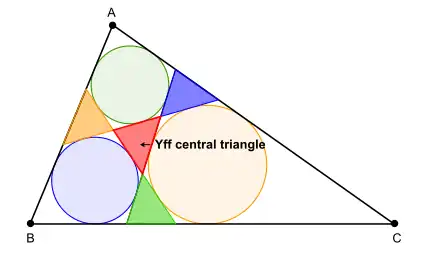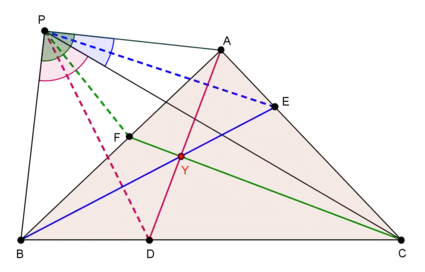In geometry, the Yff center of congruence is a special point associated with a triangle. This special point is a triangle center and Peter Yff initiated the study of this triangle center in 1987.[1]
Isoscelizer
An isoscelizer of an angle A in a triangle △ABC is a line through points P1, Q1, where P1 lies on AB and Q1 on AC, such that the triangle △AP1Q1 is an isosceles triangle. An isoscelizer of angle A is a line perpendicular to the bisector of angle A. Isoscelizers were invented by Peter Yff in 1963.[2]
Yff central triangle

Let △ABC be any triangle. Let P1Q1 be an isoscelizer of angle A, P2Q2 be an isoscelizer of angle B, and P3Q3 be an isoscelizer of angle C. Let △A'B'C' be the triangle formed by the three isoscelizers. The four triangles △A'P2Q3, △Q1B'P3, △P1Q2C', and △A'B'C' are always similar.
There is a unique set of three isoscelizers P1Q1, P2Q2, P3Q3 such that the four triangles △A'P2Q3, △Q1B'P3, △P1Q2C', and △A'B'C' are congruent. In this special case △A'B'C' formed by the three isoscelizers is called the Yff central triangle of △ABC.[3]
The circumcircle of the Yff central triangle is called the Yff central circle of the triangle.
Yff center of congruence

Let △ABC be any triangle. Let P1Q1, P2Q2, P3Q3 be the isoscelizers of the angles A, B, C such that the triangle △A'B'C' formed by them is the Yff central triangle of △ABC. The three isoscelizers P1Q1, P2Q2, P3Q3 are continuously parallel-shifted such that the three triangles △A'P2Q3, △Q1B'P3, △P1Q2C' are always congruent to each other until △A'B'C' formed by the intersections of the isoscelizers reduces to a point. The point to which △A'B'C' reduces to is called the Yff center of congruence of △ABC.
Properties

- The trilinear coordinates of the Yff center of congruence are[1]
- Any triangle △ABC is the triangle formed by the lines which are externally tangent to the three excircles of the Yff central triangle of △ABC.
- Let I be the incenter of △ABC. Let D be the point on side BC such that ∠BID = ∠DIC, E a point on side CA such that ∠CIE = ∠EIA, and F a point on side AB such that ∠AIF = ∠FIB. Then the lines AD, BE, CF are concurrent at the Yff center of congruence. This fact gives a geometrical construction for locating the Yff center of congruence.[4]
- A computer assisted search of the properties of the Yff central triangle has generated several interesting results relating to properties of the Yff central triangle.[5]

Generalization
The geometrical construction for locating the Yff center of congruence has an interesting generalization. The generalisation begins with an arbitrary point P in the plane of a triangle △ABC. Then points D, E, F are taken on the sides BC, CA, AB such that
The generalization asserts that the lines AD, BE, CF are concurrent.[4]
See also
References
- 1 2 Kimberling, Clark. "Yff Center of Congruence". Retrieved 30 May 2012.
- ↑ Weisstein, Eric W. "Isoscelizer". MathWorld--A Wolfram Web Resource. Retrieved 30 May 2012.
- ↑ Weisstein, Eric W. "Yff central triangle". MathWorld--A Wolfram Web Resource. Retrieved 30 May 2012.
- 1 2 Kimberling, Clark. "X(174) = Yff Center of Congruence". Retrieved 2 June 2012.
- ↑ Dekov, Deko (2007). "Yff Center of Congruence". Journal of Computer-Generated Euclidean Geometry. 37: 1–5. Retrieved 30 May 2012.